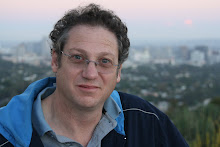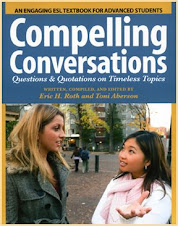Thursday, September 11, 2008
Revising the ESL Curriculum and Finding Solace with Quotes
How can I cover everything that I want in a single semester? It’s just impossible. For every new activity, I must let an old one go. If I add a Youtube homework assignment, than I should eliminate another homework assignment to maintain the balance. For instance, I asked every student to find and review a YouTube video on interview skills so I had to cut the assignment where students found and summarize an article on job hunting skills.
By the way, the international graduate English students found and reviewed a wonderful collection of smart, informative, current, and funny videos. Then I combined into a single email for the entire class with one of my own selections. On their own time and initiative, students watched many of the videos leading to the best mock job interviews that I’ve seen at the intermediate speaking skill level yet. Again, a democratic classroom atmosphere often creates a far more interesting and effective classroom.
As I continue to plan, adjust, and readjust assignments, I once again find solace in these words. Yet these continual curriculum revisions remain voluntary tasks in pursuit of excellence. “A problem,” noted Duke Ellington, “is a chance for you to do your best.”
Ask more. Know more. Share more.
Create Compelling Conversations.
Visit www.CompellingConversations.com
Sunday, July 6, 2008
Adding Classic Quotations Adds Depth, Diversity to ESL Classrooms
“If a nation expects to be ignorant and free…it expects what never was and never will be.”
Thomas Jefferson (1743-1826),
U.S. President and principal author of the Declaration of Independence
Classic quotations, like proverbs, brings in many insights from religious leaders and philosophers that go back even more than 2,000 years such as Buddha, Confucius, Aristotle, and the Biblical prophets in a compelling, succinct manner. These quotations remind us that some conversations have spanned centuries and cultures.
John Adams (1735-1826)
U.S. President and contributor to the Declaration of Independence
Create Compelling Conversations.
Visit www.CompellingConversations.com





